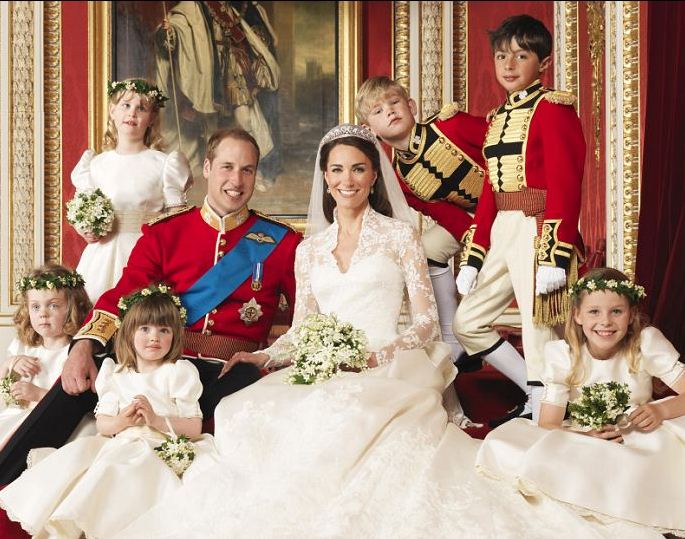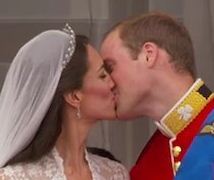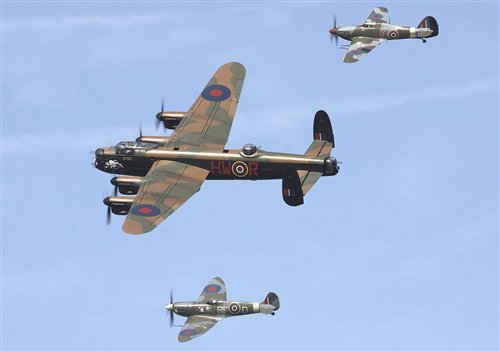The Royal Wedding; a special day for my family
The marriage of Prince William and Catherine (Kate) Middleton had greater media coverage than the most recent Olympic Games in Bejing. But what has been and what will be the significance of the event in our 21st-century United Kingdom?
 29 April 2011 was a big day for William and Catherine – and our family. 29 April 2011 was a big day for William and Catherine – and our family.
Amidst great anticipation and excitement and in a flurry of activity the great moment arrived: the new kitchen cupboard, promised by last Summer, then before Christmas, finally appeared. And the deteriorating relationship between my wife and the local joiner was restored to its former warmth. I'm afraid for me, supervising the installation took precedence over the happenings 564 miles south of where we live.
On the eve of the Royal Wedding a car journey home took me through the town of St. Andrew's were Prince William and Kate Middleton first met as students. Though subsequent TV pictures revealed that the university town had in fact celebrated the occasion in fitting and public manner, there wasn't much in evidence in the streets the evening before of wedding fever.
By way of contrast, passing through Euston Station in London two weeks previously, revealed a plethora of souvenir material and a high sense of anticipation and excitement. And these two scenarios were probably a reflection of the responses in Scotland and England respectively at a public level.
At a personal level I watched the live coverage in snatches. Not because I wasn't interested to view more of the proceedings, but rather because of the distraction of painful noises and strenuous activity through by. I wasn't so much concerned with the joiner (he had left his blood in our dwelling before) but rather for the damage to our property that the crashing sounds were implying.
Later in the day however, and restful in the knowledge of the new cupboard's advent, my beloved and I watched the recorded highlights. In terms of respective gender-based responses one of us was enraptured by the understated elegance of the bride's dress, while the other part of our duo was more focussed on the dreadful failure of lip-sync on the TV footage (the singing appeared to continue long after the lips of the wedding guests had stopped moving).
 In similar fashion while the women across the nation and the one beside me watched with bated breath for 'the balcony kiss' her spouse was rivetted to the In similar fashion while the women across the nation and the one beside me watched with bated breath for 'the balcony kiss' her spouse was rivetted to the  screen to catch the fly-past by the Battle of Britain flight of Lancaster, Spitfire and Hurricane. Aren't they lovely? In the event we both saw both (if you know what I mean). screen to catch the fly-past by the Battle of Britain flight of Lancaster, Spitfire and Hurricane. Aren't they lovely? In the event we both saw both (if you know what I mean).
But "Yes" it was a lovely bit of romantic pageantry. And "Yes" I was very happy for the couple; and pray for their continued love for one another and commitment to one other expressed at the high altar in Westminster Cathedral in the presence of the Archbishop of Canterbury, the guests and before Almighty God.
The marriage: what effect?
In terms of being the 'bedrock' of life in Britain – and not just Britain – the institution of marriage has been under sustained attack. However it is very likely that the royal nuptials have given a fillip to the romantic ideal of a life-long and unequivocable commitment which one man and one woman make to each other 'to love and to cherish' for as long as they both shall live.
The exchange of vows in a ceremony shot through with traditional Christian ritual and language - expressed in whole variety of ways - will surely have been a blow to the many in the UK who are hostile to the Christian faith and the traditions which have grown up around it.
As evidence for the above view, at least one co-habiting newspaper columnist attacked the institution of marriage with the biggest dose of vitriol that her vocabulary allowed. Meanwhile terrorist threats from both the Irish republicans and expansionist Jihadists were taken very seriously by the security services. All this in a day and events which must have been a nightmare for them, with more of the world's attention and media coverage than the most recent Olympic Games.
Confirmation
Although it elicited no great comment in the mass media, a ceremony just prior to the wedding was probably a grave set-back to many agendas.
Shortly before her wedding day, a St. James’ Palace spokesman announced that William's future bride had been confirmed as a member of the Church of England. The service had been conducted by the Bishop of London, Rev. Richard Chartres on March 10, in a private ceremony attended by her family and Prince William.
The statement said Middleton, who was baptized as a child, chose to be confirmed as part of her marriage preparations. The prince was confirmed when he was 14; also by the bishop of London.
(Confirmation - which marks a baptized Christian’s commitment to their faith - is not a precondition for marriage to a future monarch, but it will allow Middleton to receive communion in the Anglican church.) As second in line to the throne, Prince William will one day assume the title of supreme governor of the Church of England if he becomes king.
As an event it would also have caused grave disappointment to the Roman Catholic Church and its members.
Outcomes?
In the light of all of this, sustained efforts by both the Roman Catholic Church, anti-royalist separatists and secular-humanists to have the Act of Settlement repealed have received a serious setback.. (This piece of important constitutional legislation stipulates that the UK monarch cannot marry a Roman Catholic.)
Given that Prince William is both popular with the public and second-in-line to the throne it is most likely – barring any untoward event – that he will one day be king. And if he lives as long, and governs as wisely as his paternal grandmother the Queen Elizabeth II, then it looks like the UK (or England at least) will have not just a monarchy, but a Protestant monarch for many a year to come.
Whilst this prospect might dismay those groupings mentioned above, the biggest blow will have been felt by the ambitions of Islam. These are global and can brook no other authority; neither in the religious, political, legal nor social spheres. Islam is totalitarian and it has no place for monarchs; even if that monarch was married on a wave of public affection on 29 April, 2011.
But a memorable moment
Having said all of that, and back to the day most special, I trust that the newly-weds will cherish a long and happy future together. And I am confident that my wife is well-pleased to have some extra storage space in the kitchen. I'll remember the day.
|